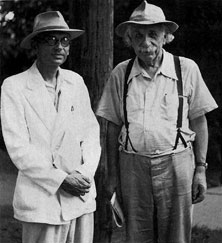

Cutting-Edge Mathematics Scholars

Kurt Gödel and Albert Einstein
“Like Gödel, wide-ranging inquiry is at the heart of the Foundation’s mission. We define our aims in terms of what we call the Big Questions—not the conventional questions of workaday scientific research but questions about the origin of the universe, the laws of nature, and our purposes as human beings.”—John M. Templeton, Jr. |
| Cutting-Edge Mathematics Scholars Awarded Major Cash Grants |
| In 2006, the Foundation celebrated
the 100th birthday of Kurt Gödel, one of Time magazine’s 100
most important people of the 20th century and a close friend
of Einstein, who was famous for his ‘incompleteness theorem’
which changed the face of mathematics. To commemorate Gödel’s
extraordinary life and work, The Kurt Gödel Society International
Research Fellowship Prize Programme was announced, and in the
spring of 2008, their first group of winners were honored at
an award ceremony in Vienna, Austria. The fellowships recognized
five mathematicians or logicians who are building on the legacy
of Austrian-American mathematician and philosopher Kurt Gödel.
The two-year program was judged by an international panel of
leading academics. The prize winners received their awards from the Austrian State Secretary in the Federal Ministry for Economics and Labour, Christine Marek. The program offered two Ph.D fellowships of approximately £30,000 per annum for two years, two post-doctoral fellowships of approximately £40,000 per annum for two years and one senior fellowship of approximately £60,000 for one year. |
The fellowship prizes went to: Andrey Bovykin Post-doctoral researcher, University of Bristol, undertaking research in foundations of mathematics (post-doctoral category) Thierry Coquand Professor at the Computing Science Department, University of Göteberg, Sweden (senior category) David Fernández Duque Ph.D. student of mathematics at Stanford University. His research deals with non-classical logic and their semantics (pre-doctoral category) Pavel Hrubeš Post-doctoral researcher, University of Toronto. Logician interested in proof complexity (pre-doctoral category) Peter Koellner Assistant Professor, Department of Philosophy, Harvard University. His main areas of research are mathematical logic—primarily set theory—and the philosophy of mathematics (post-doctoral category) |